Do Baby Birds Drink Water? What You Need To Know
Last Updated on
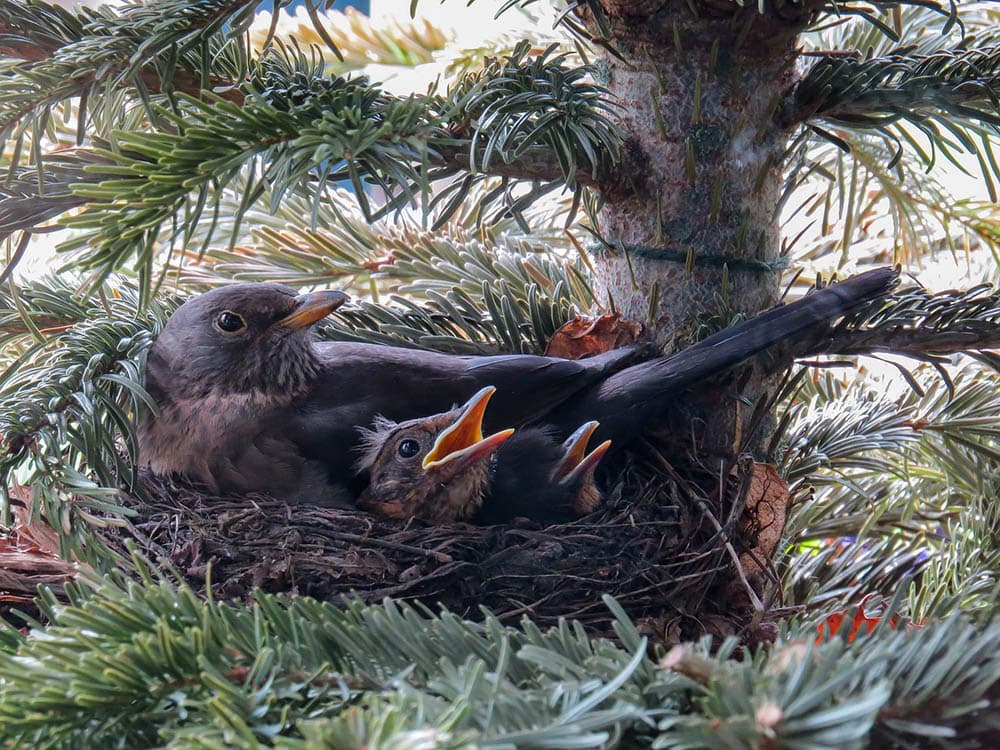
Water is a necessity for all living things, and birds are no exception. However, their mode of acquiring that water is from the food they eat. Pidegons are the only birds known to drink water directly. Baby birds do not drink water. However, at a certain stage, baby birds can drink water directly as they start to feed independently.
This article will delve deeper into the question of baby birds and their watering needs.
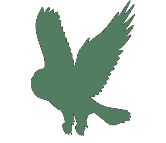
When Do Baby Birds Start Drinking Water?
Baby birds need water once they hatch. But at this stage, they cannot get the water on their own. This means that they only get it indirectly from the food they are given. The small amounts of water helps them to hydrate and aid the body’s regular functioning.
Baby birds depend on others to feed them or give them water until they can take care of themselves. They can feed on insects rich in water, but the downside is that they cannot fly to look for them.
If you keep one at home, you can offer it insects or put water in some box or birdbath. If they take small amounts of water a day, it will be enough for their bodies to perform normally, improving their health and metabolism.
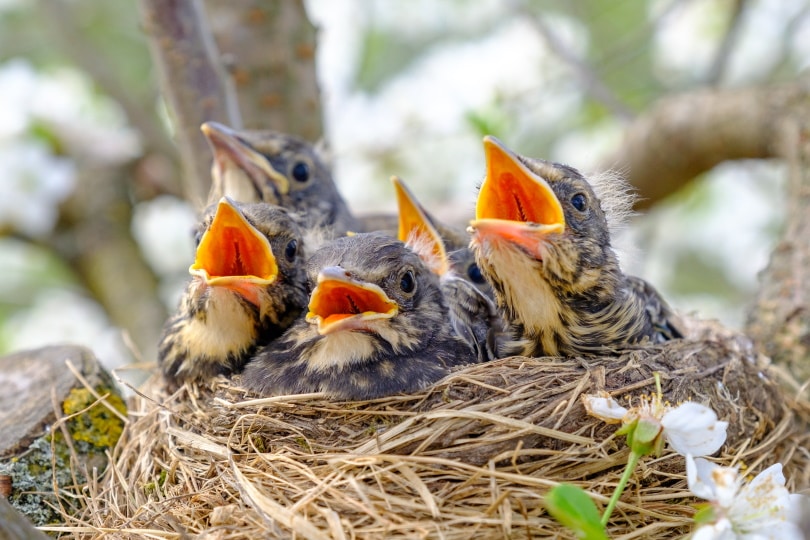
How Do You Get Baby Birds to Drink Water?
Baby birds cannot search for water until they are grown. They have to be fed water directly or supplement it in their diet.
Insects contain a large amount of water that they absorb from the ground. Feed insects to baby birds to prevent dehydration.
You can also feed them water directly by using cotton wool, a sponge, or a syringe. Alternatively, place the water in a birdbath or a container and raised the water level so the baby birds can drink easily. Ensure the birdbath or the container is not too deep. You can put some stones in the containers or birdbath to raise the water level and prevent drowning, standing, or any other harm.
How Often Do Baby Birds Need Water?
Baby birds need water regularly to prevent dehydration in their bodies. You may offer them water to drink before their daily meal. The amount of water each baby bird drinks depends on its body size and age.
Three to four days old birds need to consume water every two to three hours. One-week-old baby birds should drink water after every three to four hours.
When they have feathers in their bodies, you can increase the water intake period by six hours. Adult birds do not need a lot of water in their diet. They can eat many things to maintain their water levels up.
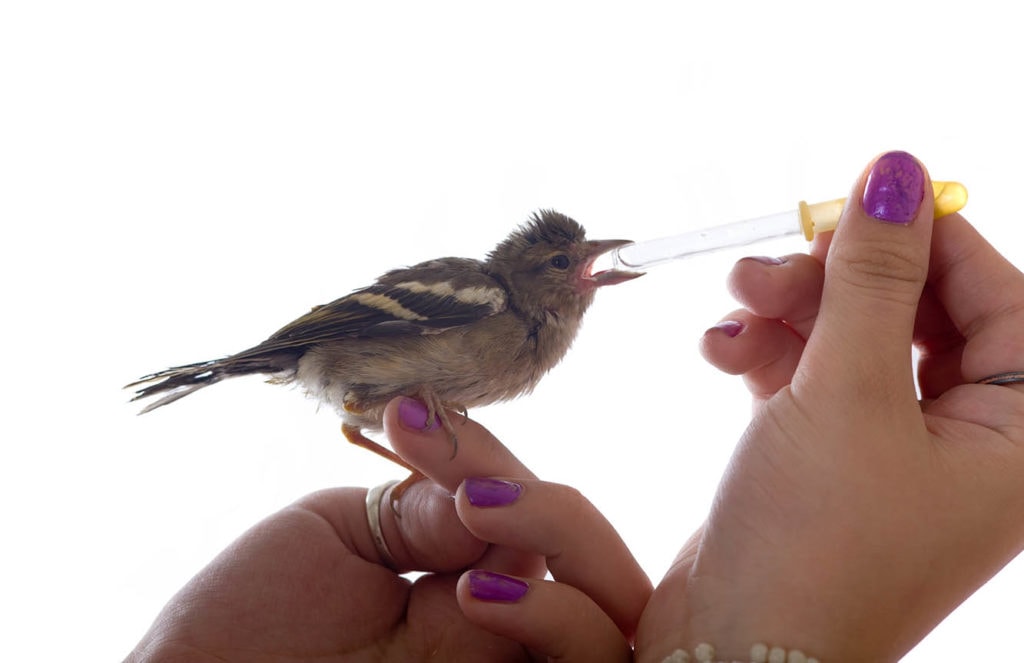
How Much Water Do Baby Birds Need?
The amount of water needed by birds depends on their age. Newly hatched baby birds cannot eat fruits, insects, or seeds. This means that they need more water, about 50–80 ml daily to ensure they are hydrated.
The amount of water taken by baby birds depends on their species:
- Parrot: parrots take water through their food like most newly hatched baby birds. From the second week, the water intake increases up to a mini bowl. The water they take is more than 3-5% of their body weight.
- Parakeet: they drink less water than the other birds. They should drink water equivalent to 3-5% of their body weight.
- Cockatiel: cockatiel requires small amounts of water when necessary. They can drink half to one teaspoon of water every day.
- Dove: doves require water equivalent to 2.8% of their body weight. This amount may differ depending on the different classes of doves.
- Robin: they drink more water than any other bird that sings. They also like taking baths and swallowing much water while doing so.
- Finch: finch needs water equivalent to 20% of their body weight daily. It can be 3/4-1 oz.
How to Keep the Water Clean For Baby Birds
You need to keep the birdbath clean to prevent baby birds from catching diseases. Clean them frequently and change the water. Once a week is enough to avoid dead leaves, the layer of algae, or bird droppings that will build up in the birdbath. Scrub the sides and bottom thoroughly to remove all the dirt.
You can also use diluted household disinfectant, but ensure you wash the birdbath rigorously to remove any traces of chemicals.
How to Keep the Water Ice-free
Baby birds need water regularly, whether the weather is cold or hot. They will also bathe during winter. When it’s freezing, birdbaths and garden ponds become more useful since most natural sources of water are frozen. It is difficult to prevent birdbaths from freezing, but the following methods may be useful:
- Pour hot water into a birdbath to melt the ice.
- Line the birdbath with a polythene sheet that can be lifted out with the ice.
- Place a metal container on three to four bricks with a night light candle beneath and cover the flame from the wind.
- Use a heater controlled by a thermostat, or a lightbulb inside a tiling pipe, then put the birdbath on it. Fit them with the right external wiring.
- You can also use a birdbath that uses solar energy to prevent water from freezing.
Do not add chemicals like glycerin, salt, or anti-freezing agents to the water. This can be poisonous and may make birds’ feathers stop being waterproof.
How Do You Know If A Baby Bird Is Dehydrated?
It is important to keep baby birds hydrated. It is equally important to examine and recognize when they are dehydrated for further treatment. If it is not treated on time, these baby birds may die.
Dehydration has different symptoms, which can be helpful in recognizing whether they are suffering. The physical appearance of baby birds may easily tell you if it’s suffering from dehydration. These include:
- When a baby bird is dehydrated, its face will appear to be dull, mainly around the eye area.
- Their baby feathers will seem discolored, and if they do not have feathers, their skin will also be discolored.
- When baby birds are dehydrated, their energy level will be low. You can observe them clearly. They will stop singing, chirping, and flying if they have already started flying. They will start sleeping a lot because they lack energy. If they stay for long without water, their muscles will stop functioning.
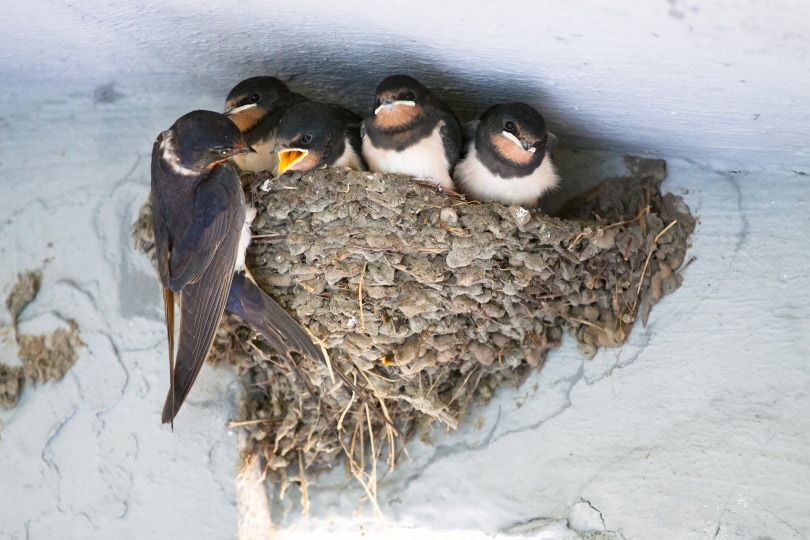
Do Baby Birds Drink Milk?
Baby birds do not drink milk. Milk appears to be toxic for them whether they drink it or supplement it in other diets such as bread.
Milk contains lactose. Baby birds do not contain lactose enzymes in their digestive system, which helps digest lactose. This makes them intolerant to milk. Indigestion of milk leads to serious stomach problems such as diarrhea. This may lead to death.
Instead of giving milk to baby birds, consider giving them other healthy diets like vegetables, seeds, and fruits.
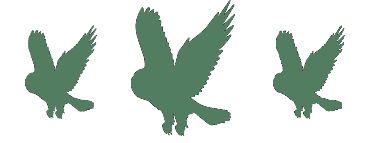
Conclusion
Every living creature must hydrate to survive. Baby birds are not an exception. Many people always wonder if baby birds can drink water. This article has shown you that they can drink water either directly or indirectly.
While the wild birds have to depend on the mother to vomit food containing water into their mouths, the domesticated ones can actually be given water directly through a bowl or syringe.
Featured Image Credit: blende12, Pixabay
Table of Contents
- When Do Baby Birds Start Drinking Water?
- How Do You Get Baby Birds to Drink Water?
- How Often Do Baby Birds Need Water?
- How Much Water Do Baby Birds Need?
- How to Keep the Water Clean For Baby Birds
- How to Keep the Water Ice-free
- How Do You Know If A Baby Bird Is Dehydrated?
- Do Baby Birds Drink Milk?
- Conclusion
About the Author Robert Sparks
Robert’s obsession with all things optical started early in life, when his optician father would bring home prototypes for Robert to play with. Nowadays, Robert is dedicated to helping others find the right optics for their needs. His hobbies include astronomy, astrophysics, and model building. Originally from Newark, NJ, he resides in Santa Fe, New Mexico, where the nighttime skies are filled with glittering stars.
Related Articles:
Can You Use Binoculars to Look At Stars? How to Choose the Right Pair
How to Clean a Refractor Telescope: Step-by-Step Guide
How to Clean a Telescope Eyepiece: Step-by-Step Guide
How to Clean a Rifle Scope: 8 Expert Tips
Monocular vs Telescope: Differences Explained (With Pictures)
What Is a Monocular Used For? 8 Common Functions
How to Clean a Telescope Mirror: 8 Expert Tips
Brightfield vs Phase Contrast Microscopy: The Differences Explained
